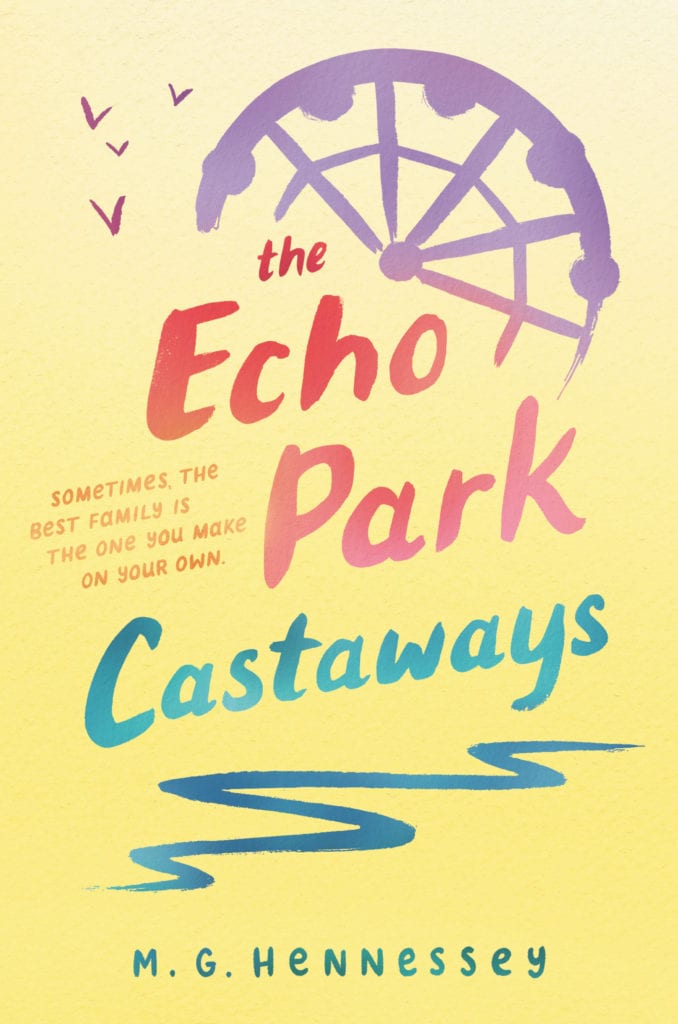
The numbers are hard to imagine: roughly 30,000 of L.A.’s children are in foster care. It can be tough to get your head around the idea that all of these kids – many who are on the autism spectrum or have learning disabilities or other challenges – are in need of help at the most basic level. It might be something we’d rather not imagine.
“The Echo Park Castaways,” the most recent book from L.A. author and advocate M.G. Hennessey, turns that around by turning the personal stories of four fictional children in the foster care system into an imaginative quest. Hennessey has worked for three years as a court-appointed special advocate, or CASA, helping children who have been removed from their homes as their cases wind through the courts. She’s also the mom of two teens, so she knows the territory well.
In this book, Hennessey introduces us to Quentin, a fifth-grade boy with autism, who, when his mom is hospitalized, is placed in the foster home of “Mrs. K.” with three other kids who are all veterans of the foster-care system. Naveah, an eighth grader, is determined to make it through high school and win a college scholarship. Vic, who is Quentin’s age, has been diagnosed with ADHD and spends most of his time fantasizing about being a secret agent rather than thinking about how his dad was deported to Nicaragua. Mara, the youngest, is trying to learn English.
“I wanted them to be really accurately representative of the kind of demographics we have in foster care here in L.A.,” Hennessey says. “It is predominately people of color, and there are a lot of kids who have some sort of learning disability or are on the autism spectrum or who have some other sort of disadvantage. Quentin, as a child on the autism spectrum, that’s actually really common. It is incredibly hard to place kids like that because they do have special needs.”
She didn’t want her characters to be stereotypes, but crafted them to reflect the children she’s encountered in the system. “Because the social workers are so overwhelmed, I try to figure out what the child needs that they’re not getting,” she explains, adding that this could be anything from an eye exam to tutoring to a ride to cub scout meetings. “Every kid I’ve met has been very different and they’ve all had very different strengths and weaknesses and they’ve all handled the situation very differently.”
It’s not Hennessey’s first time advocating through her stories. Her first book, “The Other Boy,” is also set in L.A. and tells the tale of a 13-year-old boy who hasn’t told anyone at school that he is trans, and what happens when his secret comes out.
To keep her latest book from feeling like “homework,” as she says many social-issues books can, she focused the story around a quest. Quentin misses his mom and doesn’t understand why he can’t see her, why they can’t go home. When Vic finds out that Quentin’s mother is in Torrance, he plans a mission – via public transportation – to reunite them. “I wanted it to be like ‘Stand by Me’ with foster care,” Hennessey says. “I wanted it to be about the quest, about the adventure that these kids are embarking on and how it changes their lives and brings them together.”

It won’t be giving much away to say that the ending is realistic, but hopeful, giving all four kids a new sense of belonging. “My message is there’s all different kinds of families, and that a found family can be just as good in some ways as a family you were born into,” Hennessey says. She also wanted to give readers a window into the lives of other kids who are having a very different childhood. “No matter what they’ve been through, by and large, they’re really resilient and hopeful and they’re great at finding the best of a bad situation.”
Despite the overwhelming statistics, Hennessey says she has seen some happy endings. “You need to kind of take your victories where you can,” she says. For instance, on her last case, she worked with a 10th grader who hadn’t been attending school since sixth grade and located a charter school where teachers worked one-on-one to help her catchup. “Having a kid stay in school, that alone is a huge accomplishment because 58 percent of these kids don’t graduate from high school. Having a girl not get pregnant before she turns 21 is a huge accomplishment because 75 percent of these kids do.”
Hennessey says becoming a CASA volunteer is a way to take make a real difference in what otherwise seems an overwhelming problem, because you’re just working to help one child at a time. But there are lots of other things families can do to help. Last year, her kids collected Halloween costumes to bring to family court, so that kids waiting for their appointments could choose one. Through CASA, you can also donate everything from cash to hoodies, sports equipment and YA novels.
Take a look at “The Echo Park Castaways” and see what it inspires. “My hope,” says Hennessey, “is that the audience is 8 and up, not 8 to 12.”

























